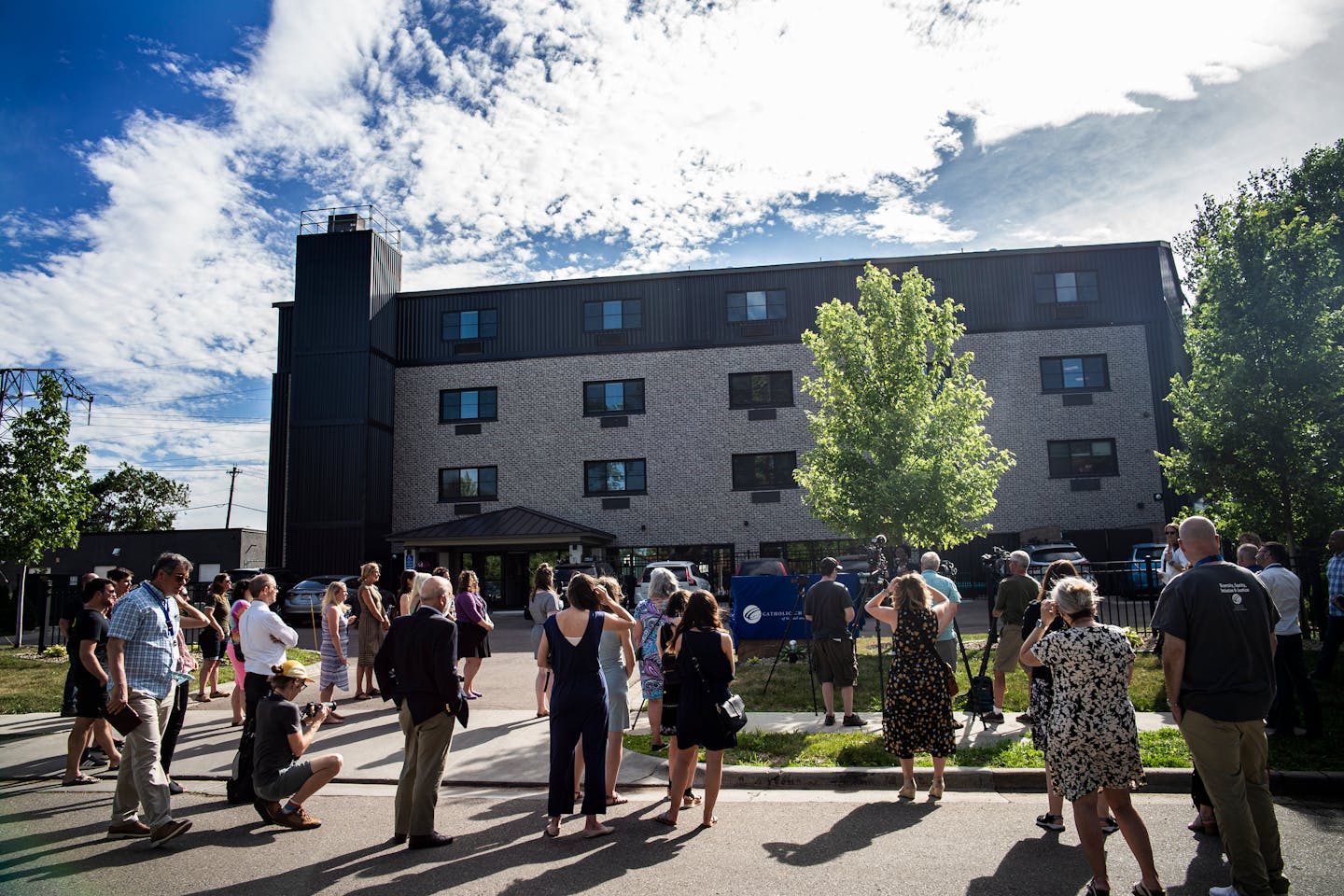A new four-story shelter in Minneapolis for homeless young adults looks like it could be an apartment building. But that's exactly what makes it special, officials say.
On Wednesday, Catholic Charities of St. Paul and Minneapolis will open the new $6 million facility for its Hope Street for Youth program — relocating the program from the former St. Joseph's orphanage, where some bedrooms slept five or six people, to a revamped assisted living facility in the Hiawatha neighborhood that boasts comfy lounges and private rooms.
"This is what our youth need," said Keith Kozerski, Catholic Charities' chief program officer. "Many of them are experiencing homelessness for the first time. We can prevent that lifetime of homelessness. We can change that trajectory."
Hope Street, which serves 30 18-to-24-year-olds — the largest emergency shelter of its kind in Minnesota — now can provide private rooms for 20 of the 30 youths, with the rest of them having only one roommate. Each bedroom comes with its own bathroom.
It's part of a growing trend in homeless shelters shifting from congregate sleeping rooms to private spaces that better serve people's needs, despite the higher cost.
The change was largely spurred by the COVID-19 pandemic, which forced homeless shelters across the state to rework their accommodations to prevent outbreaks. Instead of large shelter rooms with cots squeezed together, organizations modified arrangements to distance residents and converted overnight-only facilities to 24/7 ones.
Molly McInerny, who runs Hope Street, said advocates have wanted to provide private rooms for decades, but the cost got in the way.
"We need the community investment and support to have a program like that," she said. "It will be so much better for their mental health. Your surroundings impact how you really feel about yourself and even what you think you're capable of."
Catholic Charities bought the former assisted living facility for $6 million, with $5 million coming from Hennepin County and Minneapolis — including federal American Rescue Plan Act funding — and a $1 million gift from a donor.
The larger and more private facility will cost more to run; Hope Street's operating budget will go up next year by about $400,000, from $1.3 million this year.
"There are reasons most shelters don't look like this — it's expensive," Kozerski said.
Many of the youths to be served by the shelter, defined in state law as under the age of 24, struggle with mental health issues or trauma, he said. The privacy afforded in the new facility will give them a respite from crisis and the space to decompress before they find permanent housing and employment.
Hope Street, which Catholic Charities started 21 years ago, is one of just a few shelters in the Twin Cities serving homeless youths, who include a disproportionate number of minority and LGBTQ people. Hope Street's beds are almost always full, forcing the nonprofit to turn away 1,000 people a year. The new building has only two more beds than the former facility, so more resources are still needed.
"There's still a huge unmet need," Kozerski said. "We see youth from all over the state."
Growing resources
The new shelter is the latest project from Catholic Charities following a blitz of new buildings in the last decade.
The nonprofit opened Higher Ground, an emergency homeless shelter, in Minneapolis in 2012. In St. Paul, it opened a Higher Ground shelter in 2017 and the $100 million Dorothy Day Place in 2019, which has affordable apartments and represents the largest public-private partnership of its kind in state history.
Last month, Catholic Charities unveiled the $75 million Endeavors Residence in Minneapolis, which has affordable apartments for veterans and others struggling with chronic homelessness. It was funded with $30 million from the state, the most it has received in housing infrastructure bonds.
Hope Street was the last remaining Catholic Charities program at the sprawling campus where St. Joseph's Home for Children operated for more than a century. The nonprofit closed its child protection programs in 2020 as demand for services dwindled because of broader reforms. The 12-acre site was sold last year to Hennepin Schools, a charter school.
The new Hope Street facility, near Hiawatha Avenue and E. 41st Street, has nearly 22,000 square feet and comes with a patio, artwork, movie room and a soothing color scheme. Residents will have access to meals and case managers for help with services.
Most people stay just over a month before they find housing. For example, Hope Street gave one young man, who moved to Minnesota with no family, a safe place to live before landing a full-time job; he is now saving for his first apartment.
"The most important thing we can provide is space and time," McInerny said. "If we're able to support them now … then long term their success is much better."





